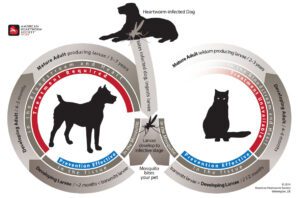April is National Heartworm Awareness Month! Heartworm disease is a serious, life-threatening disease that can affect both dogs and cats. Why should you be worried about heartworm? Contrary to popular belief, Heartworm disease is present in Oregon.
The Heartworm life cycle begins with a mosquito carrying the disease and bites a pet carrying microfilariae in its blood. If that mosquito bites another cat or dog, it transmits the larvae to that animal. Within 6-8 months, the larvae arrive at the heart. Laboratory tests to

determine whether or not your pet is positive for heartworm can range from a blood screening to x-rays. A blood sample tests for the antigens produced by an adult heartworm, which can also be examined under a microscope. Radiographs may be required to make a diagnosis if a pet is showing clinical signs and has tested positive. Clinical signs include: lethargy, difficulty breathing, loss of appetite or weight loss, vomiting or weight loss.
Treatment for dogs and cats is best when detected early. There is currently no approved product for treatment of heartworm disease in cats, however the risk is far greater in dogs and than cats. Treatment for dogs infected with heartworm entails hospitalization and close supervision. It is important to kill both the adult heartworm and the larvae. This is done through a series of injections.
Clinical symptoms develop very slowly and usually there are no visible warning signs that a dog or cat is infected until the disease has reached an advanced stage. For this reason, it is important to have your dog or cat checked for heartworms on an annual basis and take preventive medications as recommended by your veterinarian. Cascade Summit Animal Hospital highly recommends Trifexis for dogs and Revolution for cats (or dogs under 5 lbs). We also recommend and carry other heartworm preventative medications through our online store. Call us for more information!
Remember, prevention is simple compared to the expense and risk of treatment! Help keep your pet safe from heartworm disease.

